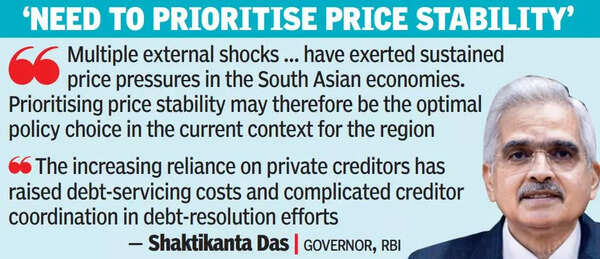India, neighbours in talks for cross-border ₹trade: RBI guv – Times of India
Delivering the keynote address at the IMF conference in Delhi, Das said that the central bank digital currency (CBDC), where the RBI has moved forward, can be an area for greater cooperation in future. In his speech, the governor highlighted the risks of high inflation and debt in the region. The IMF conference was on the current macroeconomic challenges faced by South Asia.

“The other initiative, together with the government, is the rupee settlement of international trade. We are already in discussion with some of the countries in this region and to facilitate rupee settlement of cross-border trade in the South Asian region,” Das said.
“Multiple external shocks in the form of Covid-related global supply chain disruptions, food and energy crisis following the war in Ukraine, and financial market volatility arising from the aggressive monetary policy tightening have exerted sustained price pressures in the South Asian economies,” said Das. He added that in the first three quarters of 2022, food price inflation in South Asia averaged more than 20%.
“Prioritising price stability may therefore be the optimal policy choice in the current context for the region,” said Das. He added that while sustained and broad-based economic recovery remains the current policy focus, it is necessary to undertake deep structural reforms to raise the potential growth trajectories of the economies in the South Asian region.
On debt, Das said that the surge in external debt in recent years and associated vulnerabilities have undermined macroeconomic stability in several countries of the South Asian region. This is accentuated by the fact that there has been a shift in creditor base from the Paris-club countries to private lenders. The Paris-club comprises representatives of advanced economies who have come together to find provide debt relief to poorer countries.
“The increasing reliance on private creditors has raised debt-servicing costs and complicated creditor coordination in debt-resolution efforts. During 2010-2021, the average maturity on loans from private creditors was 12 years as compared with 26 years for loans from official creditors, and the average interest rate on loans from private creditors was 5% vis-a-vis 2% on loans from official creditors,” Das said.
For all the latest business News Click Here

